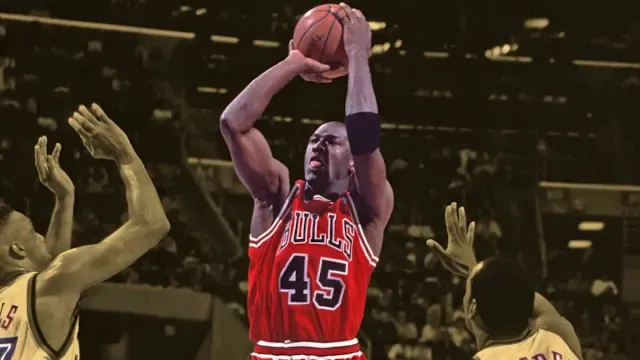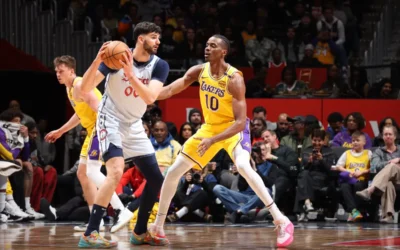Michael Jordan and the Legacy of Greatness in the NBA
The debate over who is the greatest basketball player of all time has long sparked intense discussions among fans, analysts, and former players. While the argument often centers around iconic figures like Michael Jordan, Wilt Chamberlain, and LeBron James, each player brings a unique perspective to what defines greatness in the sport. Notably, Michael Jordan’s return to the NBA in 1995 stands out as a captivating moment, particularly during his iconic 55-point game at Madison Square Garden after returning from retirement. Interestingly, Jordan himself downplayed the significance of this achievement, stating, “I didn’t come here to make a statement.” This sentiment reflects the complexity of his career and the legacy he crafted, which raises questions about the relevance of championships as the sole measure of greatness.
The 55-Point Game: Beyond Just a Statement
Michael Jordan’s 55-point game against the New York Knicks on March 28, 1995, was profound. It was a powerful reminder of his prolific scoring ability, especially considering that he had been away from the NBA for nearly two years. Fans and analysts alike were left in awe, viewing the performance as a defining moment that reaffirmed his status as a basketball icon. However, true to his humble nature, Jordan dismissed this accomplishment with a quote that resonates deeply within the basketball community. By saying he didn’t come to make a statement, Jordan emphasized his focus on playing the game rather than seeking validation through public perception.
Jordan’s Approach to Greatness
Michael Jordan’s competitive spirit and relentless work ethic are frequently cited as arguably the most critical aspects of his greatness. His determination to win was matched only by his commitment to continuous improvement. In a world where accolades are often equated to success, Jordan’s statistics are jaw-dropping, but his transcendence in the sport goes beyond mere numbers.
Jordan’s approach to basketball can be perceived as a balance between individual skill and team success. Although he has been credited with many scoring titles, his influence on the game is felt through his leadership qualities and ability to elevate his teammates’ performance, establishing an unparalleled legacy as a player.
Wilt Chamberlain’s Perspective
The debate over whether championships define greatness has been addressed by various basketball legends, particularly Wilt Chamberlain. A basketball Goliath in his own right, Chamberlain is often brought into conversations about the greatest player due to his astounding individual records, including scoring 100 points in a single game. Chamberlain once remarked that championships should not singularly predicate greatness, a view illustrating the nuances involved in such discussions.
In light of Jordan’s stardom, Chamberlain argued that statistics and personal achievements should not be dimmed by championship victories. His statement that “you can’t predicate how great a guy really is because he has championships” underscores the idea that individual contributions and talents manifest differently across players.
The Role of Rules and Context
Chamberlain’s criticism also steers into the importance of context, particularly regarding the rules of the game during different eras. When supporting arguments for or against Jordan’s greatness, it is essential to acknowledge how rule changes have influenced how the game is played. Chamberlain famously mentioned that Michael Jordan played under different regulations, which significantly affect a player’s ability to score and rack up personal achievements.
This understanding encourages sports fans to appreciate basketball not only through a lens of championships but also through the evolution of the game itself. The game of basketball today contrasts starkly with the past; scoring methods, defensive strategies, and player conditioning have all adapted to modern standards. Analyzing greatness through a modern lens can warp perceptions of players from previous eras like Chamberlain, Bill Russell, or even Kobe Bryant, leading to a skewed understanding of their contributions.
Greatness Defined: More than Just Rings
As the debate continues, it’s clear that greatness should be a broader measurement that includes personal achievements, individual statistics, and the player’s impact on the game and society. Jordan’s influence transcended basketball, leading to significant cultural shifts, brand development, and a global expansion of the sport.
Moreover, the critique from Chamberlain offers insight into the larger conversation about how societal changes, particularly in race, economics, and sports marketing, have shaped the legacies of these players differently. Jordan became an archetype for future athletes to follow—he not only played for the love of the game but also turned basketball into a business while establishing himself as a cultural icon.
Jordan vs. Chamberlain: A Comparative Analysis
The legacy of Chamberlain and that of Jordan include titanic accomplishments, though inherently different. Chamberlain’s individual records, such as those reflected by his unmatched scoring ability, set a benchmark that holds significance within the sport. However, Jordan’s combination of accolades, such as six NBA championships, five MVP awards, and 10 scoring titles, created a perfect storm that defined basketball in the ’90s and beyond.
Exploring their careers reveals the truth that greatness is complicated; it relies on both personal determination and external factors such as the supporting cast of teammates, the competitive landscape, and even the cultural moment each player found themselves in. As basketball changes, we encounter differing performances relative to their surroundings, lending credence to the idea that players’ legacy must be assessed within the context of their era.
Modern Perspectives on GOAT Conversations
In contemporary dialogues, the advent of technology and analytics has significantly changed how fans view greatness. Metrics such as Player Efficiency Rating (PER), Win Shares, and box plus-minus have become vital in assessing a player’s contribution to the success of their team. These analytical perspectives enhance the conversation surrounding Lamelo Ball, Kevin Durant, and newer stars who seem to challenge what once was considered great.
As discussions about greatness evolve, it becomes evident that limiting greatness to a single scoreboard—championships—oversimplifies the complexities of the sport. Both Jordan and Chamberlain have played fundamental roles in how basketball is narrated historically. Each offers invaluable lessons not just about winning but about perseverance, skill development, and the cultural impact of athletes.
Conclusion: Lasting Legacy Beyond Numbers
As Michael Jordan’s stature continues to loom larger than life, it’s essential to approach arguments for his greatness with nuance. His performances, particularly his 55-point game, are proof of his unmatched skill, but they also capture a deeper narrative about the game itself—one that is riddled with highs and lows, triumphs and challenges. In tandem, Wilt Chamberlain’s perspective provides a critical lens through which the conversation about greatness can evolve.
In the end, greatness in basketball, just like in any sphere, is an amalgamation of achievements, contextual factors, and the spirit of the game. As future generations reflect upon these legends, they will undoubtedly uncover layers that inform what it means to be truly great, leading to a richer understanding of basketball history.







